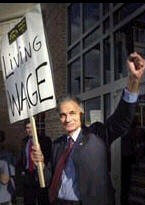 |


Ballot Measures are Failing and Passing Nationwide Oregon's Anti-Gay Ploy Appears Headed for Defeat |
|
Compiled By GayToday
The exit polls did not report a state-by-state breakdown of the results. These national exit polls differ from a national poll conducted by the Washington Blade in October and which predicted Gore would win 80% of the gay vote, Nader would take 11%, and Bush would capture 2%. The Blade poll also predicted the gay vote would be 3.7% of the total. Ballot Measures
"Oregon teaches us that when we have sufficient local infrastructure to reach out and communicate to voters the reality of our lives, we are more competitive and able to win, and that's the good news," said Elizabeth Toledo, executive director of the National Gay and Lesbian Task Force. "The bad news is that when the rights of gay, lesbian, bisexual and transgender people are subject to the will of a transitory, election-day majority, we still face uphill battles, sometimes against tremendous odds. "The election results do show how much work we have to do. We must dedicate ourselves to building local movements and making sure local activists have the support and resources to do the very important work of reaching out to voters." Oregon's voters apparently are defeating the misleadingly named "Student Protection Act," which would have required schools to remove scientific, factual books from school libraries, prohibit counseling and referral for GLBT students, ban medically accurate AIDS education and prevent teachers from teaching respect and tolerance. NGLTF partnered with the Oregon No On 9 Campaign by recruiting activists from across the country to participate in an advanced training, recruit volunteers, canvass voters, operate phone banks and help build No On 9's campaign infrastructure. Led by veteran electoral organizer Dave Fleischer of NGLTF, the Oregon project is the latest effort aimed at building local and state political power so that one day, ballot measures that attack the gay and lesbian community are a thing of the past. "Oregon teaches us that a strong grassroots campaign can overcome lies, mischaracterizations, distortions and scare tactics by our opponents," Toledo said. "Right-wing extremists who keep subjecting the Oregon GLBT community to these attacks should realize that a majority of people are not on their side." In Maine, the ballot initiative would have amended the state's Human Rights Act to forbid discrimination on the basis of sexual orientation. Toledo noted that according to a 1999 national survey, 74 percent of Democrats, 65 percent of independents and 49 percent of Republicans supported anti-discrimination laws. "Public opinion polls consistently demonstrate overwhelming public support for nondiscrimination ordinances," Toledo said. "So it's our job to translate that support into real votes. "The year 2001 will likely see more anti-GLBT ballot initiatives and more crises for our communities--but also, more opportunities as we confront these crises by building strength and infrastructure," In Nebraska, voters approved a proposal to outlaw same-sex marriages, civil unions and government recognition of domestic partner benefits. And in Nevada, voters approved a ban on same-sex marriage. Under the Nevada Constitution, the Nevada measure must be approved again at the ballot box in order for it to become law. |


